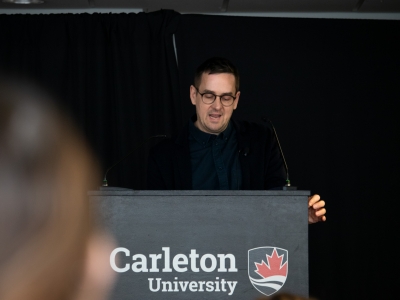The mission of the Faculty of Public Affairs to build better democracy and foster informed citizenship was well on display in the 2021 Canadian federal election. FPA researchers were highly active in the election, mobilizing their research and scholarship to support the democratic process and help voters make informed voting decisions.
FPA contributions ranged widely from studies of the election campaign to policy analyses and reports on issues in the election. The following is just a short summary of some of the many ways FPA research and expertise was featured during the election:
Scott Bennett (Political Science) provided commentary for a CPAC documentary on the Ottawa Centre constituency in which Carleton is located.
Randy Boswell (Journalism) contributed at least seventeen interventions on the election, including regular opinion commentaries in Global News and iPolitics, and commentary on radio and television panels.
Christopher Dornan (Journalism and Communication) and Jon Pammett (Political Science) are now hard at work on their book The Canadian 2021 Federal Election. This is the twelfth volume in a series begun in 1984 and a longstanding partnership between the School of Journalism and Communication and the Department of Political Science. An edited volume, the chapters draw widely from Carleton faculty including Sarah Everts, Susan Harada, Brent Popplewell, Erin Tolley, Aneurin Bosley, Nana aba Duncan, Stephen White, and alumni David McGrane and David Coletto.
Jonathan Malloy (Political Science) made various media commentaries on the election. He also wrote a Twitter essay on election signs that was picked up and turned into a national Canadian Press article.
Master’s students Jenna Richmond, Mischa Longman, and Aakanksha Sharma (Norman Paterson School of International Affairs), produced analyses of the foreign policy platforms of the three major national parties for iAffairs, NPSIA’s student-run online platform for public engagement (faculty supervisor David Carment). IAffairs also reissued its report card of the government’s foreign policy performance, authored by Dr. Carment and student assistants.
Dr. Carment and FASS colleague Richard Nimijean also wrote in The Conversation evaluating claims that the election was a pivotal point for Canada’s global engagement, drawing from their forthcoming book, Political Turmoil in a Tumultuous World, the latest volume of NPSIA’s longstanding annual Canada Among Nations series.
Jennifer Robson (Political Management) analyzed policy issues and campaign platforms in the election including party proposals on child care and housing and gave extensive media commentary including on election platform costing. She also provided technical policy advice to both partisan and non-partisan organizations involved in the election. (As well, one of Professor Robson’s Political Management students, Arielle Kayabaga (who earned her BA in Political Science at Carleton) was elected to the House of Commons.)
Saul Schwartz (Public Policy and Administration) co-wrote (with a Wilfrid Laurier University colleague) an analysis of party proposals for the elimination of interest on student loans.
Allan Thompson (Journalism) wrote an analysis for iPolitics of the growing rural-urban gap in Canadian politics. This led to further Canadian Press and radio interviews.
Erin Tolley (Political Science and Canada Research Chair in Gender, Race & Inclusive Politics) provided extensive media commentary during the election, especially on the diversity of candidates. A major CBC investigation of candidate diversity relied on her team’s dataset from past elections and Dr. Tolley did further interviews and commentary For the 2021 election Dr. Tolley worked with Aneurin Bosley (Journalism) and student assistants to update that candidate dataset.
Leah West (International Affairs), winner of the 2021 FPA Public Commentary Excellence Award, spoke regularly to journalists on the role of disinformation and foreign influence and what can be done about it during the election, drawing from her scholarship on defensive efforts during the 2019 election.
And this does not cover all FPA research impact during the election. Nor does it cover the many ways in which the election informed our teaching, including classroom simulations, discussions, and assignments.
The election displayed once again how the Faculty of Public Affairs, Canada’s only full-size Faculty devoted to public affairs and public policy, brings tremendous cross-disciplinary resources to public issues and debates.
Wednesday, December 1, 2021 in Communication and Media Studies, Department of Political Science, Journalism, News, School of Public Policy and Administration
Share: Twitter, Facebook



